Today is World Mental Health day and following World Suicide Prevention day which was the 10th September, Claire Cahill, Finance Director for Elastic FM met up with a local lady, Debbi Frost, who tragically lost her brother a few months ago and wants an opportunity to keep his legacy alive by sharing his story in the hope that she can shine a light on what others may be going through.
There is support out there for people who may be struggling, they may not know it, not be in a mental or physical safe space to ask for help so this story is to give people hope, inspiration and courage to seek out and support those who may be struggling with a hidden illness that can affect any of us at any point in our lives.
Debbie, tell me about your brother
My brother, Andrew, passed away in June this year, aged 52.
He was just 13 months younger than me, so I don’t remember a time without him in my life. I’m glad to say we shared a special bond and I was, and always will be, proud to be his sister and declare, ‘he’s my brother’.
Andrew was a lot of fun and his kind, gentle and quirky character ensured he was very popular when we were growing up. He had a wide circle of friends who shared his sense of fun and love of the tv programmes and toys and games typical of growing up in the 1970s and 80s. Just think along the lines of Scooby Doo, Batman and Robin, Rubik’s cube, BMX bikes and playing out in the street, and you’ll be at least halfway there!
His friends were a source of joy for him. He had a few aliases and nicknames over the years, including Andy, Frosty, Drew and, from back in the very early days, Tufty – after the road safety squirrel! For many years I was referred to as ‘Tufty’s sister’. I didn’t mind at all. Not one little bit. Secretly, I loved this honour and revelled in the status.
My brother made friends wherever he went as he was always keen to learn new things, share ideas and have a laugh. He maintained close friendships with many of his childhood friends throughout his life, alongside the many friends he made just as easily in his adult years.
He was an easy-going and hugely likeable person. If there ever was a human version of the saying, ‘If you can’t say anything nice, don’t say anything at all’, it was him.
He lived and breathed ‘Be kind’ before it was even a thing.
Andrew never spoke of this way of being; it was just who and how he was.
He achieved his dream of setting up his own company which has provided IT services for over 15 years to schools in the county he lived in. He was successful in every area of his life and had everything to live for. His passing is a huge shock and loss for his children and partner, family, friends and colleagues.
Losing him to suicide is horribly and profoundly sad.
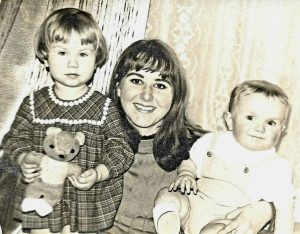
What symptoms (if any) did your brother display before deciding to end his life?
My brother had been diagnosed with depression. He experienced extremely low episodes over the years but, generally, he had learned to hide it well and the outside world would not have known the dark shadows behind his cheery smile and friendly demeanour.
Some of us were privileged to know him really well. We knew of his troubles but, we always believed he would be ok and always be there. Even with hindsight, there were no specific clues that we could have picked up on.
How would you know if someone was struggling?
There are so many ways to answer this question. It’s not straightforward and there’s no easy, single answer.
In simple terms, someone may tell us or they may show us.
Maybe their behaviour changes in obvious or subtle ways that we can pick up on. Perhaps they are quieter or more secretive or angrier than before – any of the rainbow of possibilities that exist in the range of human emotions.
I’m suggesting that we notice something that’s different for that particular person and then act on this in ways that are sensitive and helpful to them. Being realistic, that’s easier said than done, but it is important.
I’ve learned so much about suicide in just the last 10 weeks since my brother passed – one thing that has surprised me to learn is that sometimes the person seems more energetic or upbeat shortly before they die by suicide.
On reflection, we will never know if my brother’s slightly more optimistic outlook just a few weeks earlier was his genuine hope for another recovery or a sign of the ultimate decision he had made.
The best we can aim for and encourage is a conversation where the person who is struggling finds the words to express how they really feel and, in return, we are able to listen empathetically and provide a safe space for their feelings and fears to be heard and validated. We may be able to signpost them to other sources of support. Hopefully, together, these actions can help the person take further, crucial steps to access the support they need.
I’ve also learned that sometimes there are just no outward or obvious signs.
My brother was receiving professional support and the consensus is that there were no ‘clues’ that could have been picked up on by the professionals or his loved ones that could have helped to make a difference. Of course, in time, we may come to understand things differently but we can never change what has happened.
As a family, we have been approached by literally hundreds of friends and acquaintances who have said they wish he had spoken to them of his pain and plans. Truly, I believe that every single one of these people would have listened, cared deeply and acted in his best interests.
It is my dearest wish that he could’ve asked just one person for help or shared the depth of his suffering before he acted, but he didn’t. The harshest truth is that some people don’t.
We now have to respect his choice and learn to live with the worst possible reality.
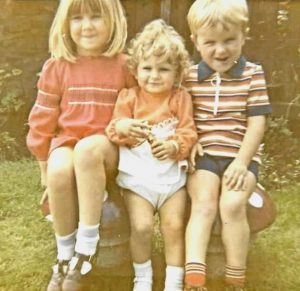
What conversations could you have with someone who is struggling?
There are people better placed to answer this, especially as it’s still a relatively new reality for me, but, I will seek to understand and learn more over time to help contribute to conversations about suicide in the hope of making a difference.
I believe that asking sincerely how someone is and actively listening to them goes a long way towards helping a person feel seen and heard. We all need to feel valued and we all can make a difference to the wellbeing of another person.
Maybe you could ask someone how they are a second time if your intuition tells you that something isn’t quite right or a friend turns down a get together or an opportunity which you know they would usually say yes to. Just as it’s OK to not be OK, it’s also OK to check and double check on someone.
I’ve also learned that it’s OK to ask directly about suicide and suicidal thoughts. It won’t be an easy conversation but it really could help someone. You could signpost to professional support. Unfortunately, in our case, we have now realised just how much support is available in terms of suicide awareness and prevention, as well as for people experiencing grief after someone may have died of suicide.
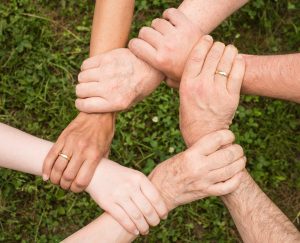
What help and support is available in Chesterfield for anyone who may be suffering with their mental health & wellbeing?
There’s help available nationally and in our local community, from the NHS or specialist support services.
Immediate help and support can be accessed from the Samaritan’s on 116 123. One early morning, fairly soon after my brother’s death, in the depths of overwhelming grief, I phoned the Samaritan’s, just to talk to someone. I will be eternally grateful to the kind and trained person who answered my call.
You can seek private counselling or therapy or access this type of help for free via the NHS. There’s no need to visit your GP to be referred, although talking to your GP about your difficulties can be helpful. You can self refer, just search online for something like ‘Talking Therapy’ or ‘Talking Mental Health’ AND your local area, and then call the number given to access help. It’s likely you will be offered an assessment to find the best type of help for you and hopefully you won’t have to wait too long.
There are also specialist organisations set up to support specific groups or people with specific problems or conditions. As male suicides are more common comparatively, some organisations are set up specifically to support men with talking about their mental health and to help make accessing support easier. I’m aware of Men-Talk in Chesterfield. It’s definitely worth searching and reaching out for help. It could be a lifeline for you or someone you care about.
CALM – the Campaign Against Living Miserably – also offers advice and support and is working to reduce the stigma around suicide.
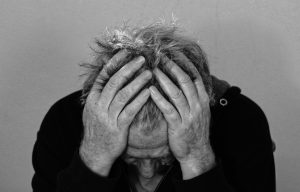
What support is available in Chesterfield for families of the bereaved?
I visited my GP who was particularly kind and caring. He signposted me to CRUSE for bereavement support.
He was interested to learn about what I have found out is available in terms of specialist support in our local community so his practice can support others in need.
It is vital that everyone, whether they feel sad, lonely, scared, suicidal or bereaved, knows where to turn for the help they need.
I was fortunate that two friends independently shared with me about the existence of SOBS – a national organisation and helpline for Survivors of Bereavement by Suicide with local groups in most areas. I was keen to talk to someone who understood the unique tragedy of losing someone to suicide. In August, just seven weeks after my brother had passed away, I was warmly welcomed to a SOBS meeting. It was quite a relief to be amongst others who (unfortunately) fully understand the overwhelming experience of finding yourself bereaved in this way. The Chesterfield group of SOBS was only set up a couple of months ago but they’re already making a huge difference to local people, like me, and helping to build networks of support in our community.
Attending meetings may not be right for everyone and there are many other ways to access help. Often this is just a call away, as with the SOBS helpline.
I’ve also had valuable conversations with the staff at The Tomorrow’s Project which is a crisis and suicide prevention project supporting people in our local area.
The younger people in our family have made contact with organisations such as Winston’s Wish and Grief Encounter.
I’ve also read a fantastic booklet called ‘Help is at Hand – support after someone may have died by suicide’. It’s a useful guide and practical resource available online, suitable for anyone bereaved by suicide.

How can the community support you & others create legacies for family members who have lost loved ones to suicide?
Being able to talk about my brother and his life and be open about how he died is really important to me. It’s about breaking down barriers and decreasing the stigma around suicide. It’s ultimately about finding ways of helping to reduce the number of people we lose to suicide. Talking can help to save lives.
What’s the mission you are on & why?
Due to the specific circumstances of my brother’s death, there are opportunities to discuss the topics of mental health, treatments and suicide with his care team and the broader community.
I think people already realise that mental health is of fundamental importance for all of us but it’s complicated and we all have a role to play if we are to progress the conversation and bring about the much needed changes which everyone could benefit from.
We are beginning to understand that trauma, often from childhood, is the root cause of many mental health problems and crises later in life. I’m looking forward to having meaningful conversations about the value of trauma informed care and the potential it has to help reduce the incidence of suicide.
My wish is that my brother’s story will help to bring about the possibility of positive changes in understanding and care.
This could help to give other people more hope of a better and brighter future.
I can’t think of a better mission or way than this to make some sense of our sadness and honour him.
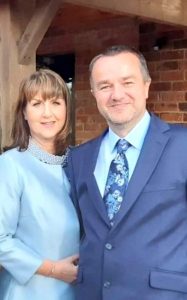
What legacy do you want to create for your brother?
It’s still early days but, in time, creating a legacy feels like it will be helpful as part of processing our grief and a great way to remember and honour my delightful brother for the wonderful person he was.
As family and friends have come together in grief we have talked about how the world would be a better place if we could ‘Be more Andrew’. By this, everyone means, be that little bit kinder, go more gently, and make the world a better place, even if that’s just for one other person.
In many ways this is also about the broader conversations we all need to have around mental health and wellbeing.
Yes, my brother had depression but he was so much more than his diagnosis. We still have so much to learn about mental health, in general, and also managing our own mental health and supporting others with theirs. Finding what works for us and keeping hopeful are critical to healthier and happier lives.
Following his death, we set up a JustGiving page to raise funds to help the work of a suicide support charity in the area my brother lived in. To date, thanks to many generous supporters, we have raised over £6000 in Andrew’s name. This will help to make a huge difference to other people and this is comforting to us at this awful time.
Thank you Debbi for sharing your story. Everyone at Elastic FM sends their thoughts and good wishes to you and your family as you still grieve for your brother and thank you for talking openly and honestly about a topic which is still raw and close to all your hearts.
Mental Health Awareness is not just for today, it’s for everyday and hopefully by Debbi sharing her story there are some tips, support groups and thoughts that can be shared with others to support them on their journey to a brighter future.

